Grammar 动名词作非谓语[下学期]
文档属性
| 名称 | Grammar 动名词作非谓语[下学期] |
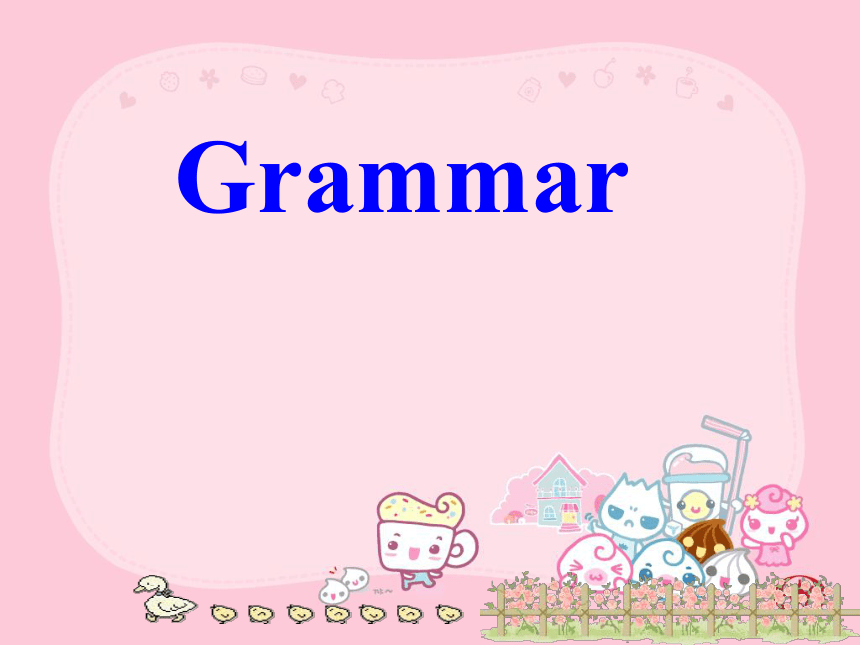
|
|
| 格式 | rar | ||
| 文件大小 | 585.3KB | ||
| 资源类型 | 教案 | ||
| 版本资源 | 通用版 | ||
| 科目 | 英语 | ||
| 更新时间 | 2007-01-07 00:00:00 | ||
图片预览

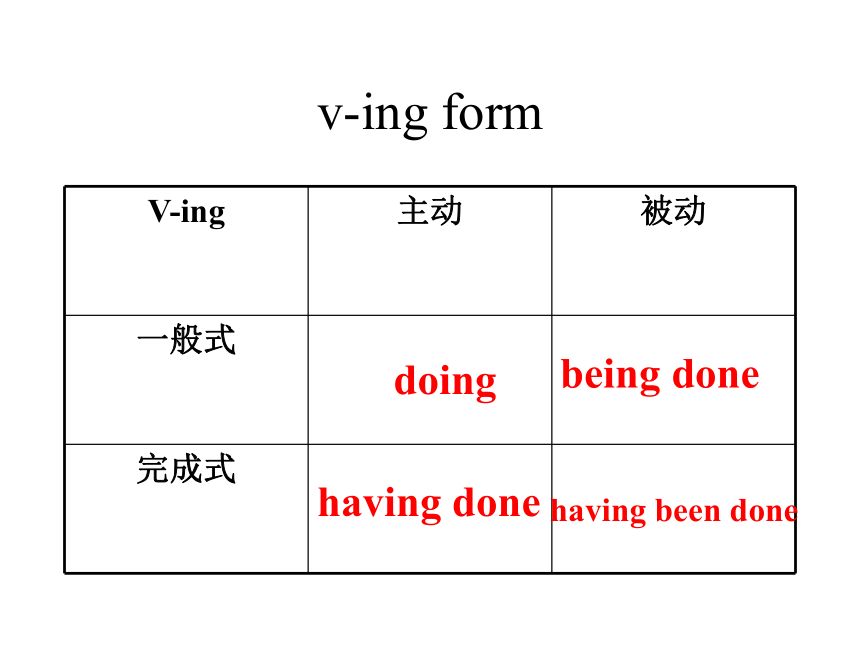
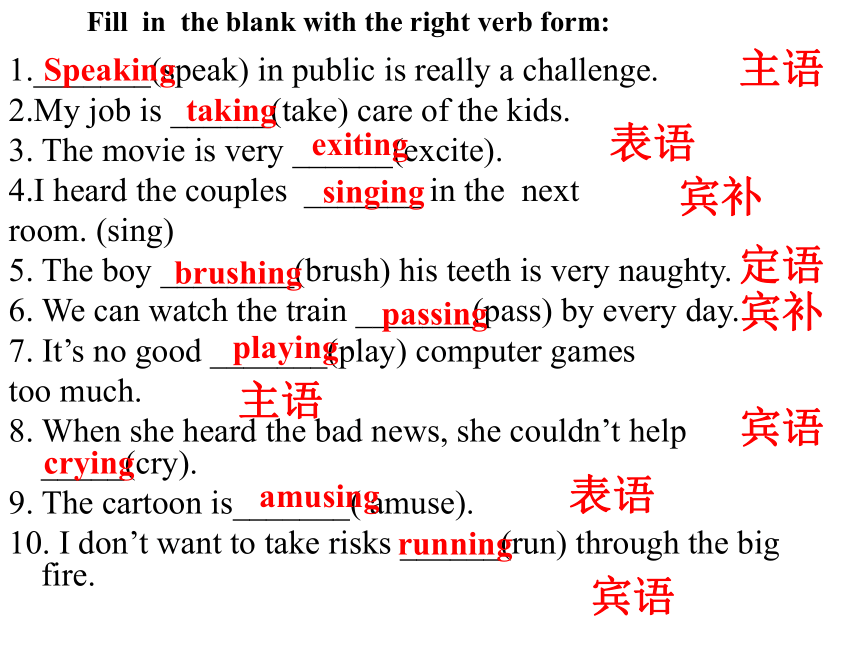
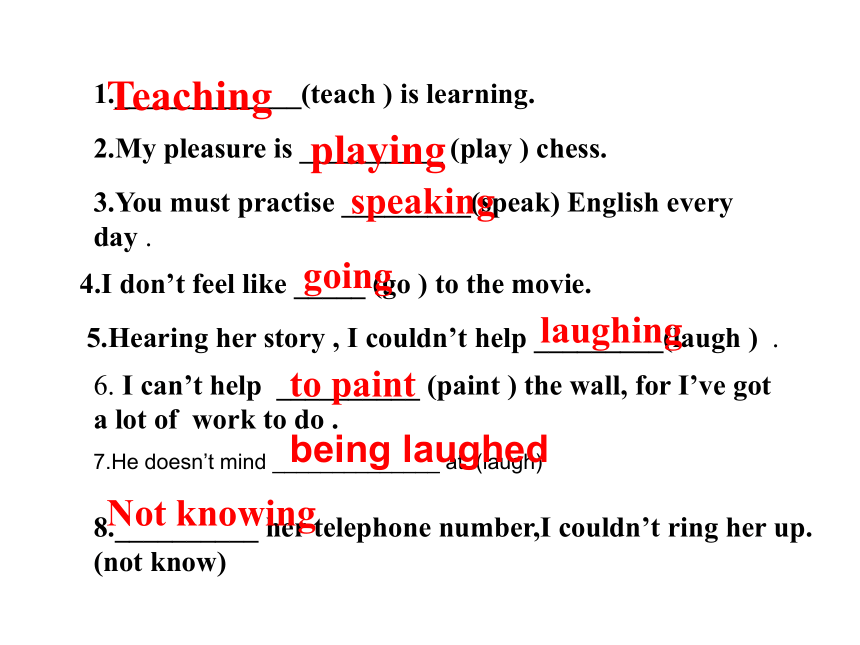
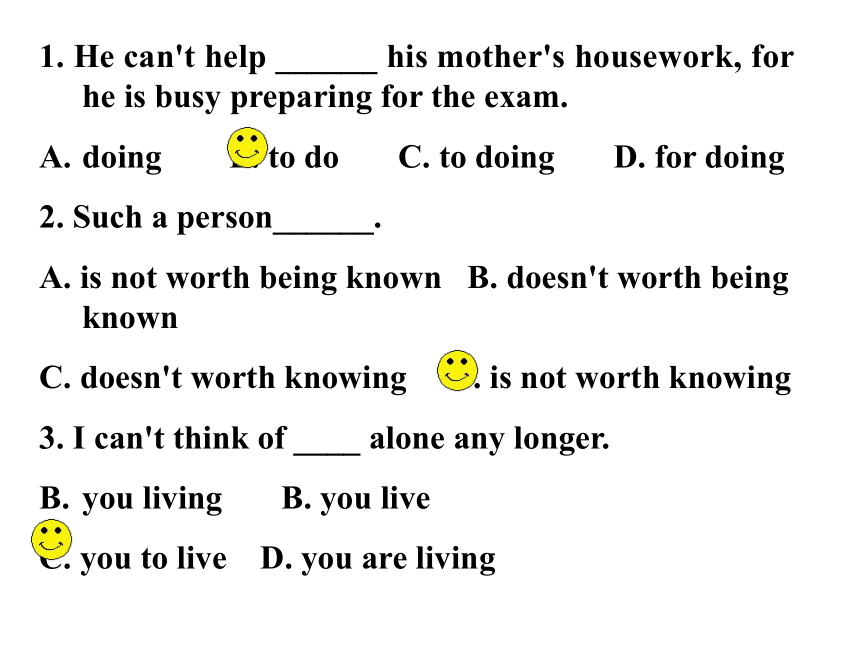
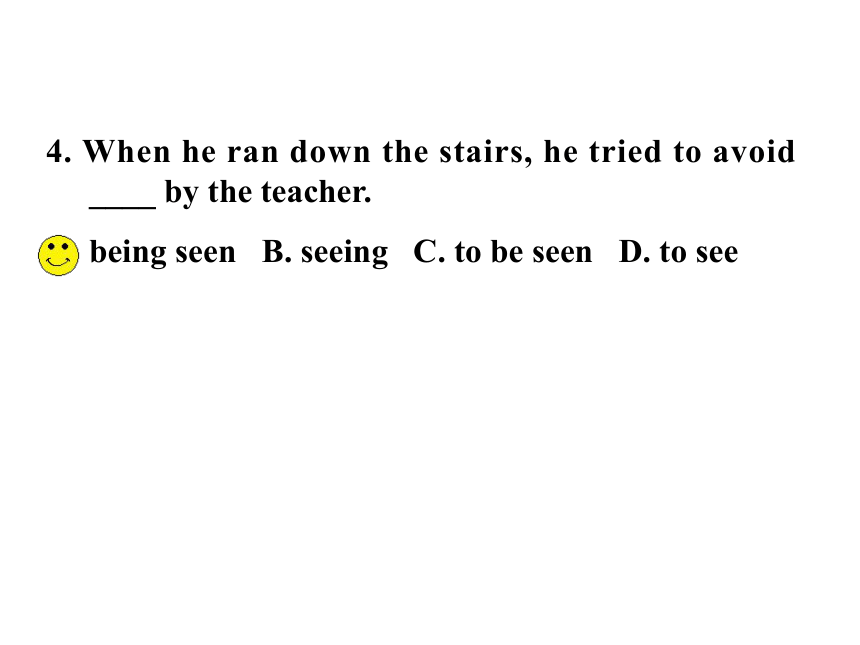
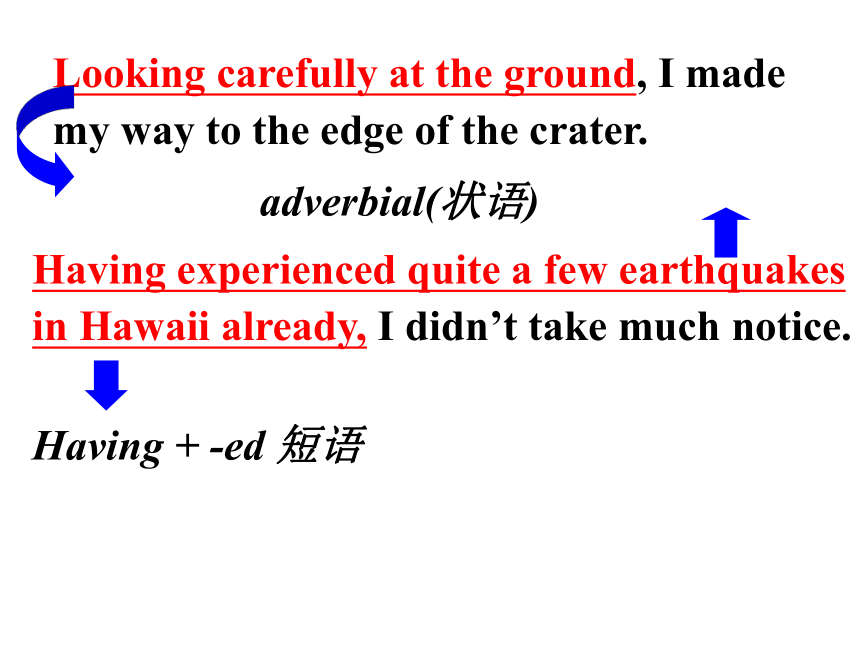
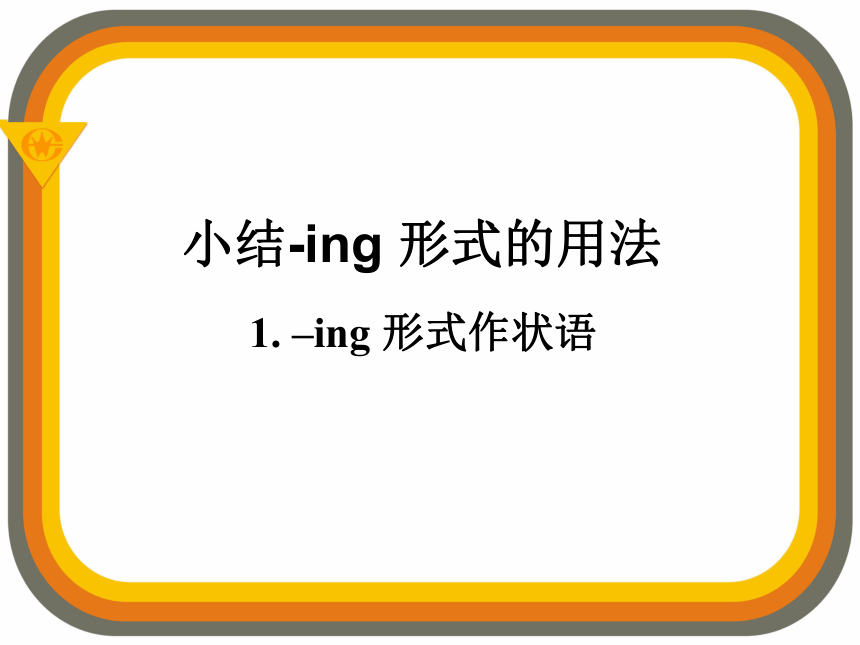
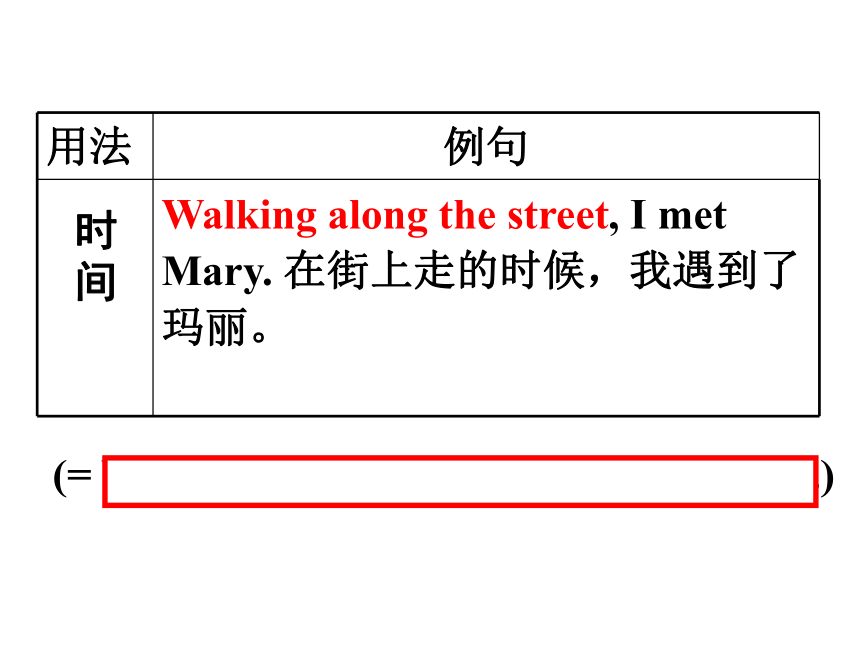
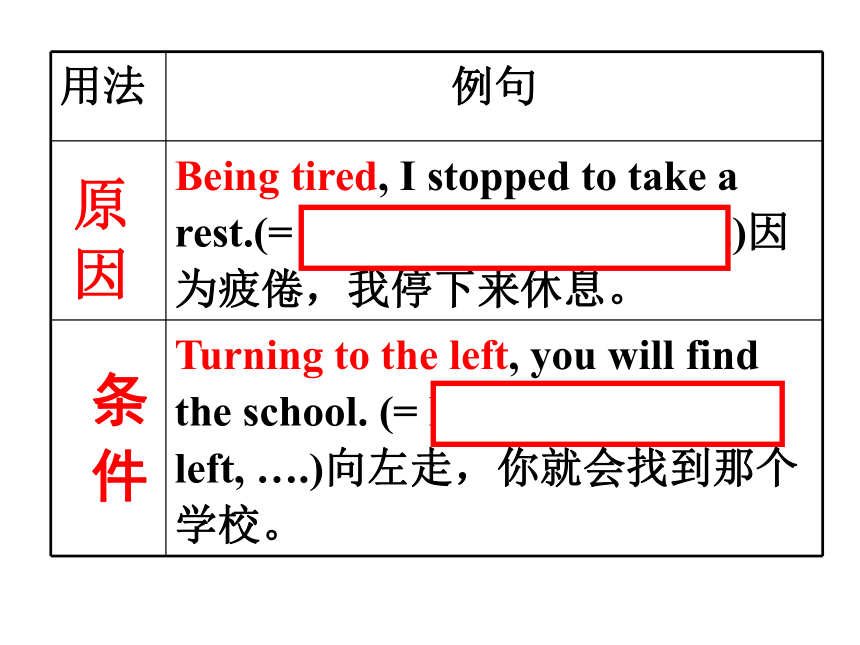
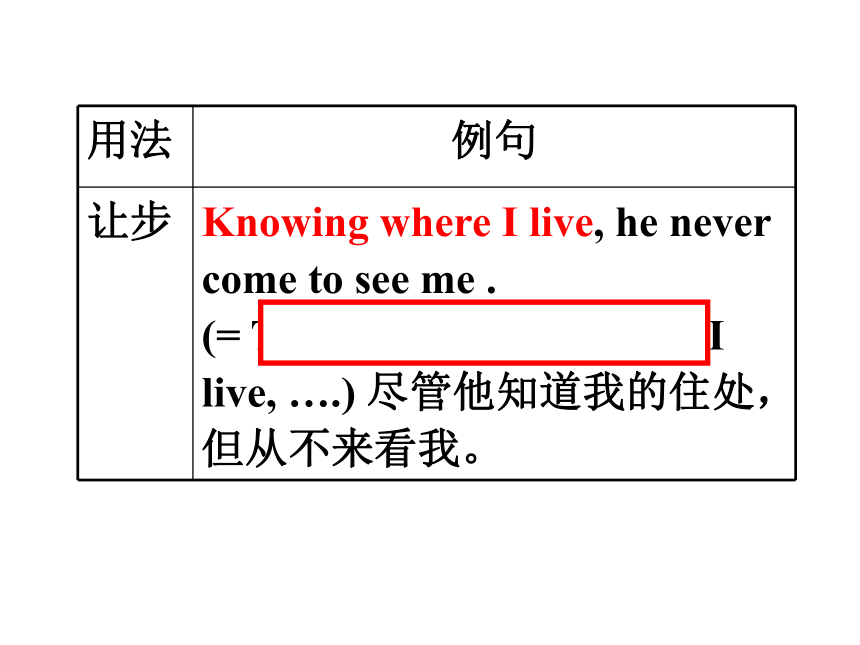
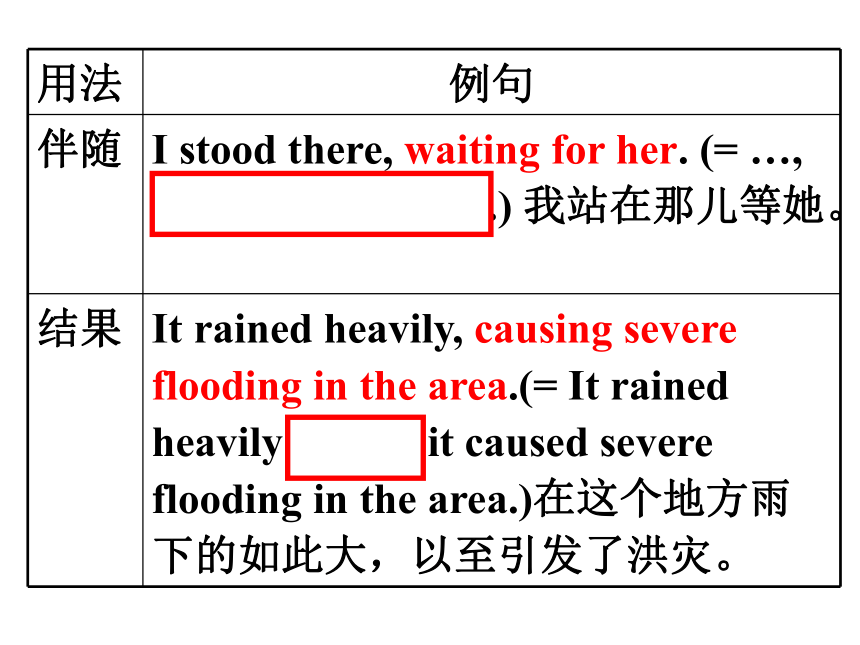
文档简介
课件37张PPT。Grammar v-ing formdoingbeing donehaving donehaving been done1._______(speak) in public is really a challenge.
2.My job is ______(take) care of the kids.
3. The movie is very ______(excite).
4.I heard the couples _______ in the next
room. (sing)
5. The boy ________(brush) his teeth is very naughty.
6. We can watch the train _______(pass) by every day.
7. It’s no good _______(play) computer games
too much.
8. When she heard the bad news, she couldn’t help _____(cry).
9. The cartoon is_______( amuse).
10. I don’t want to take risks ______(run) through the big fire.
SpeakingexitingsingingbrushingpassingplayingcryingamusingrunningFill in the blank with the right verb form:taking主语表语宾补定语宾补主语宾语表语宾语1._____________(teach ) is learning.2.My pleasure is __________ (play ) chess.3.You must practise _________(speak) English every day .5.Hearing her story , I couldn’t help _________(laugh ) .4.I don’t feel like _____ (go ) to the movie.6. I can’t help __________ (paint ) the wall, for I’ve got a lot of work to do .8.__________ her telephone number,I couldn’t ring her up. (not know)TeachingplayingspeakinglaughingNot knowinggoingto paint7.He doesn’t mind ______________ at .(laugh)being laughed1. He can't help ______ his mother's housework, for he is busy preparing for the exam.
doing B. to do C. to doing D. for doing
2. Such a person______.
A. is not worth being known B. doesn't worth being known
C. doesn't worth knowing D. is not worth knowing
3. I can't think of ____ alone any longer.
you living B. you live
C. you to live D. you are living4. When he ran down the stairs, he tried to avoid ____ by the teacher.
being seen B. seeing C. to be seen D. to seeLooking carefully at the ground, I made
my way to the edge of the crater.Having experienced quite a few earthquakes
in Hawaii already, I didn’t take much notice.adverbial(状语)Having + -ed 短语小结-ing 形式的用法
1. –ing 形式作状语时间(= While I was walking along the street….)原因条件2. –ing形式的完成式(Having been) written in haste, the book has some faults. 这本书因仓促写成,所以有些缺憾。表示被动可直接用过去分词 3. 使用- ing形式
需注意的几个问题。My wife had a long talk with Sally, explaining why she didn’t want the children to play together.
我妻子与莎莉谈了很长时间, 解释她为什么不想让孩子们在一起玩。(explaining是句子主语my wife做的动作,它们之间是主动关系,
即explaining的逻辑主语,就是句子的主语my wife 。) The train having gone, we had to wait another day.
(the train逻辑主语 + having gone 即为独立主格结构)分词 (短语) 作状语时, 其逻辑主语必须与句子的主语一致。
如果不一致,必须用独立主格结构来表示,也就是在分词前面加上它的逻辑主语。 1.Having been told many times, but he
still couldn’t understand it. 2.He was told many times, but he still
couldn’t understand it.
3.Having been told many times, he still
couldn’t understand it.YesNOYes分词短语做状语时,前面可以加上连词或介词,但是分词短语和句子之间不能用并列连词(如but,and),
因为并列连词接的是两个并列成分,而分词短语只是全句的一个状语部分,分词和主句之间可用逗号。-ing的一般式和完成式现在分词都可以表示先后接连发生的动作,
完成式现在分词更加强调先发生的动作。Having brushed his teeth, Mr. Brown
came downstairs for breakfast.
布朗先生刷过牙, 就下楼来吃早饭。 (此句如写成: Brushing his teeth,
Mr. Brown came downstairs for
breakfast. 可能指 “边刷牙, 边下楼 。)
Not knowing how to find the subway,
I asked a policeman for help. 我不知怎样找到地铁,就去找警察帮忙。 分词的否定形式是在分词短语前面加上 not, never等否定词构成。 Rewrite the sentences using
–ing form of the underlined verbs. Ex: 1.When they heard about the volcano
they ran down to the village.Hearing about the volcano, they ran down to the village.
2. Because I had experienced
earthquakes before, I wasn’t
frightened. Having experienced earthquakes
before, I wasn’t frightened.
4. When she woke up in the middle of the
night she saw her room was as light as
day. Waking up in the middle of the night
she saw her room was as light as day. 5. As soon as we had stopped the car,
we put on our protective clothing. Having stopped the car, we
immediately put on our protective
clothing. 6. As I came out of my house,
I saw the volcano erupting. Coming out of my house,
I saw the volcano erupting.7. As I had never seen a volcano
erupting before, I was very excited.Never having seen a volcano
erupting before, I was very excited.Exercises1. _____ the championship, he was awarded a million dollars.
A. Won B. Winning
C. Having won D. Being won
2. ______ only book knowledge, you will not be able to work well.
A. Had B. Have C. Having D. To have
3. I saw a lot of children playing in the garden most of them _____ girls.
A. are B. being C. were D. having4. The old man could not sleep at night, his wrongs _____ him no peace.
A. gave B. give C. being giving D. giving
5. ____ in the queen for half an hour, I suddenly realized that I had left my wallet at home.
A. To wait B. Waiting
C. Having waited D. To have waited7. “We can’t go out in this winter,” said Ted, ____ out of the window.
A. looking B. to look
C. looked D. having looked
8. _____ a reply, he decided to write again.
A. Not receiving B. Receiving not
C. Not having received D. Having not received10. ____ the room, I found the recorder stolen.
A. Entering B. To enter C. Enters D. Entered
11. “What on earth have you done?” mother said _____ to the broken vase on the ground.
A. angrily pointing B. and point angrily
C. angrily pointed D. and angrily pointing
12. _____ by car, we visited many places.
A. Travel B. Traveling
C. To travel D. Having travelled小结:
1.只接动名词作宾语的常见动词有十六个:
resist, mind, suggest, delay, keep on ,look forward to, enjoy, include, appreciate, imagine, practise, finish, succeed in, consider, can’t help,miss。
抗议推迟盼喜报,心想练成考不错
2.介词后要加v-ing 形式喜欢考虑不可免
停止放弃太冒险
承认理解很值得
反对想象莫推延
要求完成是期望
建议继续勤操练
不禁原谅要坚持
继续注意便成功enjoy, consider, escape
stop, give up, risk
admit, understand, be worth
mind, imagine, delay, put off
require, finish, look forward to
suggest, go on, practise
can’t help, excuse, insist on
keep on, mind, succeed inHomeworkDo Ex 4 on Page 36 in exercise
book and hand it in.
2.My job is ______(take) care of the kids.
3. The movie is very ______(excite).
4.I heard the couples _______ in the next
room. (sing)
5. The boy ________(brush) his teeth is very naughty.
6. We can watch the train _______(pass) by every day.
7. It’s no good _______(play) computer games
too much.
8. When she heard the bad news, she couldn’t help _____(cry).
9. The cartoon is_______( amuse).
10. I don’t want to take risks ______(run) through the big fire.
SpeakingexitingsingingbrushingpassingplayingcryingamusingrunningFill in the blank with the right verb form:taking主语表语宾补定语宾补主语宾语表语宾语1._____________(teach ) is learning.2.My pleasure is __________ (play ) chess.3.You must practise _________(speak) English every day .5.Hearing her story , I couldn’t help _________(laugh ) .4.I don’t feel like _____ (go ) to the movie.6. I can’t help __________ (paint ) the wall, for I’ve got a lot of work to do .8.__________ her telephone number,I couldn’t ring her up. (not know)TeachingplayingspeakinglaughingNot knowinggoingto paint7.He doesn’t mind ______________ at .(laugh)being laughed1. He can't help ______ his mother's housework, for he is busy preparing for the exam.
doing B. to do C. to doing D. for doing
2. Such a person______.
A. is not worth being known B. doesn't worth being known
C. doesn't worth knowing D. is not worth knowing
3. I can't think of ____ alone any longer.
you living B. you live
C. you to live D. you are living4. When he ran down the stairs, he tried to avoid ____ by the teacher.
being seen B. seeing C. to be seen D. to seeLooking carefully at the ground, I made
my way to the edge of the crater.Having experienced quite a few earthquakes
in Hawaii already, I didn’t take much notice.adverbial(状语)Having + -ed 短语小结-ing 形式的用法
1. –ing 形式作状语时间(= While I was walking along the street….)原因条件2. –ing形式的完成式(Having been) written in haste, the book has some faults. 这本书因仓促写成,所以有些缺憾。表示被动可直接用过去分词 3. 使用- ing形式
需注意的几个问题。My wife had a long talk with Sally, explaining why she didn’t want the children to play together.
我妻子与莎莉谈了很长时间, 解释她为什么不想让孩子们在一起玩。(explaining是句子主语my wife做的动作,它们之间是主动关系,
即explaining的逻辑主语,就是句子的主语my wife 。) The train having gone, we had to wait another day.
(the train逻辑主语 + having gone 即为独立主格结构)分词 (短语) 作状语时, 其逻辑主语必须与句子的主语一致。
如果不一致,必须用独立主格结构来表示,也就是在分词前面加上它的逻辑主语。 1.Having been told many times, but he
still couldn’t understand it. 2.He was told many times, but he still
couldn’t understand it.
3.Having been told many times, he still
couldn’t understand it.YesNOYes分词短语做状语时,前面可以加上连词或介词,但是分词短语和句子之间不能用并列连词(如but,and),
因为并列连词接的是两个并列成分,而分词短语只是全句的一个状语部分,分词和主句之间可用逗号。-ing的一般式和完成式现在分词都可以表示先后接连发生的动作,
完成式现在分词更加强调先发生的动作。Having brushed his teeth, Mr. Brown
came downstairs for breakfast.
布朗先生刷过牙, 就下楼来吃早饭。 (此句如写成: Brushing his teeth,
Mr. Brown came downstairs for
breakfast. 可能指 “边刷牙, 边下楼 。)
Not knowing how to find the subway,
I asked a policeman for help. 我不知怎样找到地铁,就去找警察帮忙。 分词的否定形式是在分词短语前面加上 not, never等否定词构成。 Rewrite the sentences using
–ing form of the underlined verbs. Ex: 1.When they heard about the volcano
they ran down to the village.Hearing about the volcano, they ran down to the village.
2. Because I had experienced
earthquakes before, I wasn’t
frightened. Having experienced earthquakes
before, I wasn’t frightened.
4. When she woke up in the middle of the
night she saw her room was as light as
day. Waking up in the middle of the night
she saw her room was as light as day. 5. As soon as we had stopped the car,
we put on our protective clothing. Having stopped the car, we
immediately put on our protective
clothing. 6. As I came out of my house,
I saw the volcano erupting. Coming out of my house,
I saw the volcano erupting.7. As I had never seen a volcano
erupting before, I was very excited.Never having seen a volcano
erupting before, I was very excited.Exercises1. _____ the championship, he was awarded a million dollars.
A. Won B. Winning
C. Having won D. Being won
2. ______ only book knowledge, you will not be able to work well.
A. Had B. Have C. Having D. To have
3. I saw a lot of children playing in the garden most of them _____ girls.
A. are B. being C. were D. having4. The old man could not sleep at night, his wrongs _____ him no peace.
A. gave B. give C. being giving D. giving
5. ____ in the queen for half an hour, I suddenly realized that I had left my wallet at home.
A. To wait B. Waiting
C. Having waited D. To have waited7. “We can’t go out in this winter,” said Ted, ____ out of the window.
A. looking B. to look
C. looked D. having looked
8. _____ a reply, he decided to write again.
A. Not receiving B. Receiving not
C. Not having received D. Having not received10. ____ the room, I found the recorder stolen.
A. Entering B. To enter C. Enters D. Entered
11. “What on earth have you done?” mother said _____ to the broken vase on the ground.
A. angrily pointing B. and point angrily
C. angrily pointed D. and angrily pointing
12. _____ by car, we visited many places.
A. Travel B. Traveling
C. To travel D. Having travelled小结:
1.只接动名词作宾语的常见动词有十六个:
resist, mind, suggest, delay, keep on ,look forward to, enjoy, include, appreciate, imagine, practise, finish, succeed in, consider, can’t help,miss。
抗议推迟盼喜报,心想练成考不错
2.介词后要加v-ing 形式喜欢考虑不可免
停止放弃太冒险
承认理解很值得
反对想象莫推延
要求完成是期望
建议继续勤操练
不禁原谅要坚持
继续注意便成功enjoy, consider, escape
stop, give up, risk
admit, understand, be worth
mind, imagine, delay, put off
require, finish, look forward to
suggest, go on, practise
can’t help, excuse, insist on
keep on, mind, succeed inHomeworkDo Ex 4 on Page 36 in exercise
book and hand it in.
